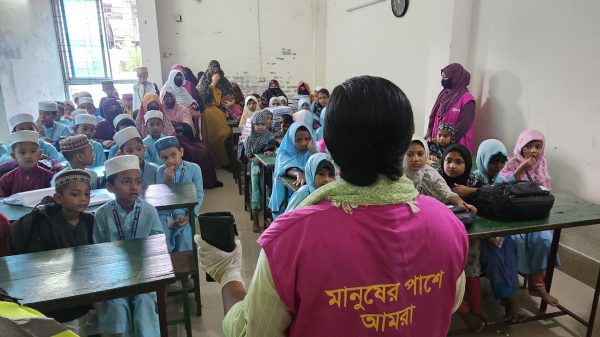Ordinance-Making and Democratic Deficit in Bangladesh: A Constitutional and Comparative Perspective

- Update Time : Wednesday, July 2, 2025

In the contemporary constitutional and geopolitical landscape of Bangladesh, the expanding reliance on ordinances as an instrument of governance raises serious concerns regarding democratic legitimacy, the separation of powers, and constitutional continuity. Article 93 of the Constitution of the People’s Republic of Bangladesh permits the President to promulgate ordinances when Parliament is not in session and where immediate legislative action is required. However, such a provision is inherently provisional and must be interpreted narrowly, for its misuse can bypass the very democratic processes the Constitution is designed to uphold. Recent developments—including the dissolution of Parliament in 2024 and the promulgation of a series of ordinances, including one restructuring the National Board of Revenue—have rekindled debate over whether ordinance-governance is compatible with the norms of constitutional democracy.
This concern is amplified by an increasing tendency in political discourse to conflate popular mobilizations or mass uprisings with electoral mandates. While public demonstrations and civic activism are legitimate expressions of democratic engagement, they do not substitute for the formal democratic mandate that can only be conferred through free, fair, and inclusive elections. A mass uprising may indeed signal public discontent or demand reform, but the legitimacy to govern—to enact law, restructure institutions, or represent the people—must emanate from a valid electoral process. Otherwise, executive acts during interim periods risk lacking both procedural legitimacy and popular consent.
The use of ordinance-making in lieu of parliamentary law-making is not unique to Bangladesh, and comparative constitutional jurisprudence across Commonwealth countries reinforces its problematic nature when used outside emergency contexts. The Indian Supreme Court, in the seminal case of D.C. Wadhwa v. State of Bihar (AIR 1987 SC 579), declared the repeated re-promulgation of ordinances without placing them before the legislature as a “fraud on the Constitution”. Justice Bhagwati emphasized that ordinances are not parallel legislation, but extraordinary tools designed for exigencies, and must be subjected to parliamentary scrutiny at the earliest opportunity. The ruling underlines a broader constitutional principle: ordinance-making is a constitutional exception, not an alternative to the legislative process.

Similarly, in Federation of Pakistan v. Aftab Ahmad Khan Sherpao (PLD 1992 SC 84), the Supreme Court of Pakistan affirmed that executive ordinances must remain subject to constitutional limitations and legislative ratification. The Court warned against permitting ordinances to become “permanent features of governance”, for such practice devalues the role of Parliament and weakens democratic accountability. These decisions demonstrate that the judiciary in other South Asian jurisdictions has consistently resisted executive encroachment on legislative authority.
In the United Kingdom, while no equivalent ordinance mechanism exists, delegated legislation and executive prerogative powers are tightly controlled by statutory and constitutional convention. The UK Supreme Court’s decision in R (Miller) v. Secretary of State for Exiting the European Union [2017] UKSC 5 affirmed that Parliamentary approval is constitutionally required for major changes to domestic legal rights, and that the executive cannot bypass the legislature under the pretext of prerogative authority. This principle holds important analogical value for Bangladesh, where significant structural or administrative reforms via ordinance—especially in transitional periods—can seriously destabilize constitutional governance and the rule of law.
From a scholarly standpoint, frequent ordinance-making introduces what political scientists and constitutional theorists call a “democratic deficit.” It marginalizes parliamentary debate, excludes opposition voices, and concentrates power in the executive, thereby undermining both transparency and accountability. Scholars such as Mark Tushnet and Bruce Ackerman have warned against “executive unilateralism” in emerging democracies, where fragile institutions often lack the capacity to resist autocratic trends. In Bangladesh, this risk is particularly acute when ordinances are issued during politically sensitive periods without a sitting Parliament to scrutinize them.

Legal uncertainty also arises when ordinances are issued and later not ratified, or are invalidated by courts. The Bangladeshi judiciary has intervened in several cases to reassert constitutional supremacy. In Kudrat-E-Elahi Panir v. Bangladesh (44 DLR [AD] 319), the Appellate Division declared unconstitutional an ordinance dissolving elected local councils. Similarly, the infamous Indemnity Ordinance of 1975—which protected the killers of Sheikh Mujibur Rahman—illustrates the profound and lasting damage executive ordinances can cause when not subject to legislative oversight. Though later repealed, its existence for decades demonstrates how ordinances can be used to obstruct justice and entrench illegitimacy.
What follows from this is a foundational constitutional proposition: no ordinance should have the force of law unless and until it is ratified by the subsequent Parliament. This is essential not only to ensure legal certainty, but to uphold the democratic principle that the consent of the governed must be obtained through their elected representatives. This is especially urgent in the context of impending general elections in Bangladesh. Any reform—whether administrative, institutional, or electoral—must be introduced through parliamentary debate and enacted through proper legislative procedure, not via executive proclamation.
To further protect democratic integrity, the Constitution should be interpreted—and if necessary, amended—to prevent any fundamental reform or institutional restructuring through ordinances, particularly those affecting elections, constitutional bodies, or fundamental rights. Parliament must remain the central forum of political accountability, and democratic legitimacy must derive from elections—not from executive discretion, caretaker arrangements, or even well-meaning mass protests. Only through the electoral process can the people of Bangladesh confer the authority necessary for governance and reform.

In sum, mass uprising and electoral mandate are not interchangeable concepts. While public demonstrations may indicate political urgency, only a general election can provide the legal and moral mandate to govern. The continued use of ordinances in Bangladesh without timely parliamentary ratification risks distorting this constitutional truth and threatens the democratic fabric of the nation. To preserve constitutionalism, ensure political legitimacy, and restore public trust, all reforms must be passed through Parliament, and the role of the elected legislature must be re-centred as the guardian of the people’s will.
Ahamed Ihteyaz Tahmid is a Barrister-at-Law of Lincoln’s Inn and an Advocate of the Supreme Court of Bangladesh. He holds an LLB (Hons) from SOAS, University of London, and is a constitutional researcher and jurist.
References
- D.C. Wadhwa v. State of Bihar, AIR 1987 SC 579 (India).
- Federation of Pakistan v. Aftab Ahmad Khan Sherpao, PLD 1992 SC 84 (Pakistan).
- R (Miller) v. Secretary of State for Exiting the European Union [2017] UKSC 5 (United Kingdom).
- Kudrat-E-Elahi Panir v. Bangladesh, 44 DLR (AD) 319 (Bangladesh).
- Ridwanul Hoque, ‘The Use and Abuse of Ordinance-Making Powers in Bangladesh’ (2012) 10(2) NUJS L Rev 233.
- Bruce Ackerman, The Decline and Fall of the American Republic (Harvard UP 2010).
- Mark Tushnet, Weak Courts, Strong Rights (Princeton University Press 2008).
- Tom Ginsburg, Judicial Review in New Democracies: Constitutional Courts in Asian Cases (Cambridge UP 2003).
- Md. Zahir, Emergency and the Ordinance-Making Power in Bangladesh (1994) BLJ 1.







Leave a Reply